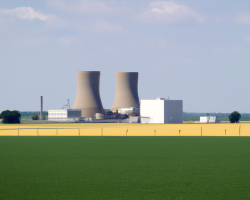Category of Content
Siting Experience Documents Only
Publication Date
Subject Matter
Keywords
The Art of Being Ethical and Responsible: Print Media Debate on Final Disposal of Spent Nuclear Fuel in Finland and Sweden
The Art of Being Ethical and Responsible: Print Media Debate on Final Disposal of Spent Nuclear Fuel in Finland and Sweden
After decades of preparation, the final disposal of spent nuclear fuel has reached the construction stage in Finland, and the neighboring Sweden is likely to soon follow in the footsteps. These Nordic countries rely on a similar technical concept based on passive safety, advocated as a means of minimizing the burden to future generations. The scholarly literature on the ethics of nuclear waste management has thus far paid little attention to the views of the broader publics on the associated ethical challenges.
Intergenerational justice starts now: Recognizing future generations in nuclear waste management
Intergenerational justice starts now: Recognizing future generations in nuclear waste management
Intergenerational justice is an inherent component of nuclear waste management. By looking at challenges of intergenerational justice at various stages of the repository siting process, the following thesis is discussed: Current generations can anticipate notions of intergenerational justice by applying high procedural standards to enable equitable distribution between generations and thus adequately recognize the needs of future generations. Applying high standards in this context means a constantly critical, reflexive, and open process, without bias or selfishness.
Intergenerational Ethical Issues and Communication Related to High-Level Nuclear Waste Repositories
Intergenerational Ethical Issues and Communication Related to High-Level Nuclear Waste Repositories
Purpose of Review: The nuclear power industry started in the 1950s and has now reached a phase of disposing high-level nuclear waste. Since the 1980s, the United Nations has developed a concept of sustainable development and governments have accordingly made ethical commitments to take responsibility towards future generations. The purpose of this review is to examine ethical dilemmas related to high-level nuclear waste disposal in a long-term perspective including potential access to the waste in the future.
Perceptions of justice influencing community acceptance of spent nuclear fuel disposal. A case study in two Finnish nuclear communities
Perceptions of justice influencing community acceptance of spent nuclear fuel disposal. A case study in two Finnish nuclear communities
Final disposal of spent nuclear fuel (SNF) from nuclear power plants (NPPs) is an ethical issue with implications within and across generations. We address this issue from the perspective of nuclear communities that host nuclear waste disposal sites. These are primarily the communities that face injustice due to the potential radiological risks. A resident survey (n = 454) was conducted in two Finnish nuclear communities, i.e. Eurajoki and Pyhäjoki, that are being considered as alternative sites for a second repository for SNF.
Developing a Siting Strategy for a Nuclear Fuel Waste Management Facility
Developing a Siting Strategy for a Nuclear Fuel Waste Management Facility
Although different policies for radioactive waste management, including nuclear fuel waste (NFW), have developed in different countries, the basic challenge is the same everywhere: finding a method and a place for isolating the radioactive waste from the biosphere. During the last decade, this issue has moved to a new phase where responsible authorities and companies are now facing the task of implementing waste disposal or management strategies. A number of countries (e.g.
Consent-Based Siting: What Have We Learned?
Consent-Based Siting: What Have We Learned?
The president realized that the nation lacked a clear policy for developing a deep-mined geologic repository for high-level radioactive waste and spent nuclear fuel. New legislation would be required to chart a more promising path forward. The views of multiple parties had to be taken into account. He decided to create a high-level body to ventilate the issues involved and to make recommendations. He charged the group with holding public meetings and soliciting comments on draft documents to make the deliberations as transparent as possible.
Application of Sensitivity/Uncertainty Methods to Burnup Credit Criticality Validation
Application of Sensitivity/Uncertainty Methods to Burnup Credit Criticality Validation
Research Supporting Implementation of Burnup Credit in the Criticality Safety Assessment of Transport and Storage Casks
Research Supporting Implementation of Burnup Credit in the Criticality Safety Assessment of Transport and Storage Casks
Science based responses to social myths on nuclear energy
Science based responses to social myths on nuclear energy
In order to promote a sound basis for considering the role of nuclear in climate change, this review spans the technical topics of social and political debate surrounding nuclear energy with a focus on the objective science of these issues including nuclear waste, accidents and overall risk. Novel aspects include the emergence of nuclear energy as being potentially renewable and the antithesis of Fukushima being an argument for the unacceptable risks associated with the use of nuclear energy.

